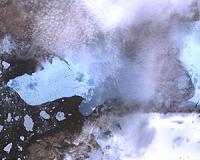| . |  |
. |
Bremerhaven, Germany (UPI) Sep 13, 2010 The ice around the North Pole has experienced another severe meltdown this year, German scientists said. Around 1.9 million square miles of the Arctic Ocean will be covered by ice by the end of this summer, the third-lowest figure since satellite monitoring began in the 1970s, scientists from the University of Hamburg and the Alfred Wegener Institute for Polar and Marine Research said Monday. In the past four years, the average ice coverage in mid-September was around 2 million square miles, led by a record meltdown to 1.6 million square miles in 2007 from an average winter height of 5.4 million square miles. The scientists attributed the latest meltdowns to a combination of man-made climate change and seasonal temperature shifts. The German statistics come on the heels of a report on Arctic sea ice by the U.S. National Snow and Ice Data Center, which released similar figures last week. Both reports indicate that Arctic ice is thinning, meaning that it takes less energy to melt it. "There are claims coming from some communities that the Arctic sea ice is recovering, is getting thicker again," Mark Serreze, director of the American center, told Postmedia News. "That's simply not the case. It's continuing down in a death spiral." The melting of the Arctic ice sheets means that the oceans in the region are increasingly ice-free during the summer months. This is opening a new Atlantic-Pacific shipping channel and makes the vast natural resources lying under the seabed more accessible. Nations have laid conflicting claims to the seabeds. Russia and Norway have rowed over their Barents Sea territories, while the United States and Canada disagree over a swath of the Beaufort Sea and over the Northwest Passage, which in 2007 for the first time in modern history was free of ice. The U.N. Convention on the Law of the Sea, a treaty ratified by all nations with interests in the Arctic except the United States, states that Arctic border countries can claim ownership of natural resources up to 200 nautical miles off their coasts. Arctic nations are now exploring to where their continental shelves extend -- findings that could increase their territories. Observers have warned that the legal conflict over boundaries might evolve into a military one. Russia sparked concern when one of its submarines planted a flag in the seabed in territory it considers its own at the North Pole in 2007. In general, military activity in the region has increased in recent years.
Share This Article With Planet Earth
Related Links Beyond the Ice Age
 Giant ice island breaks in two
Giant ice island breaks in twoNewark, Del. (UPI) Sep 11, 2010 A giant iceberg four times the size of Manhattan that split off from a Greenland ice sheet last month has split in two, U.S. satellite images show. The ice island broke apart after smashing into Joe Island, a small rocky outcrop in the Nares Strait west of Greenland, CNN reported Saturday. The ice island split from the Petermann Glacier in early August, moving up the Petermann Fj ... read more |
|
| The content herein, unless otherwise known to be public domain, are Copyright 1995-2010 - SpaceDaily. AFP and UPI Wire Stories are copyright Agence France-Presse and United Press International. ESA Portal Reports are copyright European Space Agency. All NASA sourced material is public domain. Additional copyrights may apply in whole or part to other bona fide parties. Advertising does not imply endorsement,agreement or approval of any opinions, statements or information provided by SpaceDaily on any Web page published or hosted by SpaceDaily. Privacy Statement |